Articles about reggae music, reviews, interviews, reports and more...
Interview: Chezidek
- Home
- Articles
- Interviews
- Interview: Chezidek

Interview: Chezidek
"A thousand years is just an evening gone in the sight of The Almighty"
Sampler
Chezidek (born Desbert Johnson, St Ann’s Bay, Jamaica, 1973) is something of a throwback to the deeply spiritual and reflective Rastamen of reggae’s so called golden age. Yet like many other Jamaican artists he actually started as a deejay, going by the name Chilla Rinch before switching handles and concentrating on singing in his unique delicate style.
Since then he has cut five albums and numerous singles. He hooked up with Xterminator records’ Phillip Fatis Burrell for his long-playing debut, 2002’s 'Harvest Time', and 2005’s 'Rising Sun' (both on VP). These were followed by 'Mash Dem Down' in 2006 (Al.Ta.Fa.An), 2007’s 'Firm Up Yourself' (Cousins), and his masterpiece, the Bobby Konders produced 'Inna Di Road' (Greensleeves) which utilised retreads of time honoured rhythms made famous by Yabby You, Bob Andy, Al Campbell and the Abyssinians. This record was a godsend during a comparatively dry patch for roots reggae fans and established this soft-spoken, environmentally conscious singer as a formidable creative force.
2009 brought two more releases: 'Herbalist' (Tad’s) and 'I Grade' (Tabou 1), the latter for legendary producers-come-rhythm-section Sly and Robbie. Angus Taylor spent several hours in a house in London’s New Cross where Chezidek and his backing band Digital Cut were holed up in preparation for a mini tour of the South of England. This is the wisdom he shared.
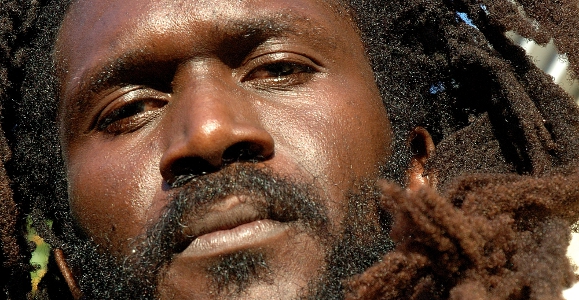
How did you first get started in music?
Music was always there. From as long as we can remember we always singing and into whatever thing the music is. I was in the marching band as a little youth; I used to play the bugle. In school there were school concerts, at home always singing to people. But as a professional career it was the 1990’s. ’94 I really started pushing through.
Why do you think so many great reggae artists old and new have come from the parish of St Ann?
The vibes. Burning Spear, Bob Marley, Justin Hinds so many mightiful artists. It’s a cultural place and a spiritual place also. St Ann is where the guy they claim discovered Jamaica, Christopher Columbus, built his first city. It is also, where I come from in St Ann, in St Ann’s Bay, where the honourable Marcus Garvey is from. So all these prophetic spiritual vibrations are always there. And great reasoning from the elders is always in the surrounding of these things in St Ann when you go around. Cultural energy is strong there so the vibration is there from long time. Our ancestors, their ancestral spirit there is very strong.
When did you embrace Rasta?
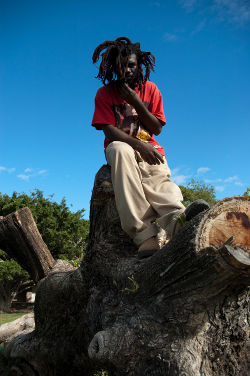 When I realised the fullness. It was when I was maybe about 20-something when we start going through a stage in our life when we are searching. But we were always a spiritual one. We were always seeking of The Almighty and in the presence of the elements that keep us going and preserve life. So in that time Far I opened the doors and made we see a brighter day.
When I realised the fullness. It was when I was maybe about 20-something when we start going through a stage in our life when we are searching. But we were always a spiritual one. We were always seeking of The Almighty and in the presence of the elements that keep us going and preserve life. So in that time Far I opened the doors and made we see a brighter day.
Tell me about your beliefs. Is there a particular order or mansion of Rasta do you belong to?
Well as I and I bigger brother tell you, I and I don’t deal with beliefs. I and I just live in the way that we can feel that connection and the pureness and the presence of The Almighty you know? Just like a plant. Not every plant will grow everywhere. Some plants will grow in some places and thrive more in some places than other places. So wherever righteousness is, that is where the Rastaman always wants to be, whether it is in this room or out in the middle of the road there. But within Rastafari some people might see another house there or another house there but if you look really good you will see there is just one house. Love is the foundation and whichever house you might build, however mighty and great and big it might be, if the foundation isn’t solid it is going to fall and crumble. So love is the foundation man and Rastafari say love so love we say every time.
What drives the sentiments in your songs?
I’d say it’s words of righteousness every time. We always choose to say the right thing or have the intention or the desire to say the right thing so it may connect and reach the ones who hunger for these things. Because if a man’s belly is full and you give him food it means nothing. But if a man is so hungry that he has almost died and he gets a little, he knows what is good for him is good for him. So we want to say the things that really can heal the broken heart and uplift the spirit of the people in whichever form. In many different aspects, not just religiously but every way. In people’s love affairs, there are songs we sing to help lift them up within a righteous way. We sing love songs to uplift the people in a righteous way.
How come you’ve released two albums so close together: Herbalist on Tad’s and I Grade with Sly and Robbie?
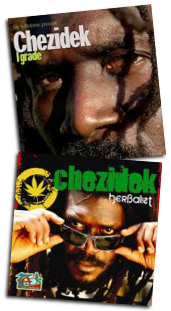 One of them, Herbalist we’ve been working on a little while now. Some of the songs that are on that album were already released on another album called Mash Dem Down that didn’t reach. Some others are new songs that we were also working towards the album. And a lot of songs and some singles also that are already out there but weren’t on albums like “Sun Or Rain”, and some other nice little songs that the fans would like to hear. Because the singles don’t get out there in the same way as most of the albums so some singles still have to go on albums. They put it together, came up with a nice idea and did the thing you know? It’s sounding good also. But I Grade, now, is a different thing! Just a project, straight, where we’re just working on an album. Sly and Robbie, they put down some ideas, and you know those guys are the real ones in music. The real thing you know? So it was really a great honour to be able to work with Sly and Robbie. It was a really nice vibes. One that could just free up ourself for a minute and sing what we really feel.
One of them, Herbalist we’ve been working on a little while now. Some of the songs that are on that album were already released on another album called Mash Dem Down that didn’t reach. Some others are new songs that we were also working towards the album. And a lot of songs and some singles also that are already out there but weren’t on albums like “Sun Or Rain”, and some other nice little songs that the fans would like to hear. Because the singles don’t get out there in the same way as most of the albums so some singles still have to go on albums. They put it together, came up with a nice idea and did the thing you know? It’s sounding good also. But I Grade, now, is a different thing! Just a project, straight, where we’re just working on an album. Sly and Robbie, they put down some ideas, and you know those guys are the real ones in music. The real thing you know? So it was really a great honour to be able to work with Sly and Robbie. It was a really nice vibes. One that could just free up ourself for a minute and sing what we really feel.
Herbalist has many producers. I Grade is all Sly and Robbie rhythms. Which style of working do you prefer?
I prefer it when I work on a project and just focus on one thing. I think I do better that way because that’s how I originally came out on Xterminator label with Philip Fatis Burrell. We were just working on projects, singing songs for 'Harvest Time' and 'Rising Sun'. So I feel more into the music that way instead of just doing one here and another one there then they put them together. I like the original thing where the musicians get together and we work and create sounds with a strong and meaningful message.
How did you come to record with Sly and Robbie?
It was through one of my brethrens that we kind of grew up part of the way together. Because one time I was in Kingston in the ghettos too as a youth and one of the guys there he went further and became an engineer working with Sly and Robbie. So he came to me first and said ‘Come along and do a thing there’ and we do one song, (sings) ‘I SMOKE HIGH GRADE!!!’ We do that one first nice. So that was the beginning of it.
How does working with Sly and Robbie differ from say Fatis or Bobby Konders?
Working with Sly and Robbie is very like working with Fatis. Because Fatis is one of these man who is at the top of the thing within music. So everything is to a standard just like Sly and Robbie. Bobby Konders also, but Bobby Konders is like my brethren who was producing me from even before I became Chezidek so he is like an easier vibes. We were just taking it easy and anything that comes up in my head we’d just sing. But it works. He comes with an idea, with a riddim and the riddim plays, we listen it and I just burn a spliff and sing whatever comes up in my head. (Laughing) That’s how it is with Bobby Konders. But those songs hit you know! With Bobby Konders it works. Different producers give you different vibes and they also pull out different message. Because if I am working with a producer the song I am writing doesn’t only have something to do with me but with him also. Because when I’m writing I am thinking about him also so it’s a vibes.
You link environmentalism with herbs in “Keep I Rolling” and “Leave The Trees”. Are the two part of the same thing?
Yeah man, they are one thing! Because I tell you this, “Leave The Trees” is a song that just came naturally. I was singing about the herb and thinking about the herb and by singing it, it comes out. Because with some of the songs it’s not like I say ‘All right, I’m going to do this.’ It start out this way and then it comes out another way so you will never really know it will be like that. A lot of the songs I sing, it is after I really get a good listen at what I am saying that I realise. Some of the things just come naturally, like a cold wind might blow through or a bird flying by. But in our life we always want to have a desire to be amongst nature and love to see natural things natural as they are and as they were created. So yes, we are environmentalist. We strongly live that way and we love to see everyone live that way: taking creation into consideration. The earth is the fullness thereof so we have to preserve it. Every creature, every plant, every species, even the herb that I am smoking, is so necessary and relevant. It’s oneness because everything is connected. We are all connected. Even though we might not be touching we are connected through the air, (laughing) you know what I mean?
On your song “Need More Love” from your Sly and Robbie album you talk about a stronger united Africa. Do you think Africa needs to industrialise more? Will this affect the environment?
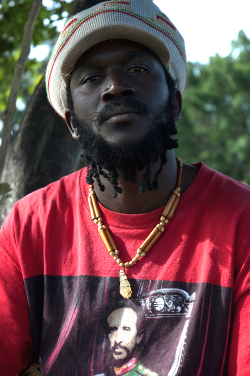 They can industrialise in a clean way man. There are other ways and means of doing things and we must move on. That’s why, moving on, as I say, we have to consider creation. Too much of anything is good for nothing. It’s just the way how you deal with the thing. Just like you can have a drink but if you drink too much you’re going to destroy yourself my brother. But you don’t want to live a stressful life and a frustrated life – you know what I mean? So, yeah, Africa has to rise up in every way and the potential is there in many ways. I’m not the one to go and point and say ‘This is what’s got to be done here see?’ But I know that Africa can rise. Africa has the ability just like everywhere else. African people are powerful people. Very, very powerful people. Africa is where most things started. Africa was on top centuries ago in Egypt and those places. So, whichever way, this is time for the sleeping giant to arise now and get the thing going. All these great philosophers and thinkers have to just rise up now. I am only the trumpet that is sounding to awake them. They know what to do.
They can industrialise in a clean way man. There are other ways and means of doing things and we must move on. That’s why, moving on, as I say, we have to consider creation. Too much of anything is good for nothing. It’s just the way how you deal with the thing. Just like you can have a drink but if you drink too much you’re going to destroy yourself my brother. But you don’t want to live a stressful life and a frustrated life – you know what I mean? So, yeah, Africa has to rise up in every way and the potential is there in many ways. I’m not the one to go and point and say ‘This is what’s got to be done here see?’ But I know that Africa can rise. Africa has the ability just like everywhere else. African people are powerful people. Very, very powerful people. Africa is where most things started. Africa was on top centuries ago in Egypt and those places. So, whichever way, this is time for the sleeping giant to arise now and get the thing going. All these great philosophers and thinkers have to just rise up now. I am only the trumpet that is sounding to awake them. They know what to do.
Your music sounds modern but has a link with the roots music of past. Who are your favourite reggae artists from that era?
The ancient sound, man. It sounds like an ancient sound to me still. We are here in this modern time and we just sing natural and things around us are modern but it is an ancient sound. The message don’t have no age you know? The message is forever, I-ternal. So it’s today, yesterday and tomorrow. I love Peter Tosh, Bob Marley, Joseph Hill, Toots, Burning Spear, Big Youth. I love those artists and listen to those artists a lot. And Bob Andy! I love Bob Andy! I listen to Bob Andy from a long time when I was little. Lots of great singers, man. Some times I listen to just pure Toots for a couple of months and then a couple of months of pure Bob Marley, because those vibes take a hold, and then Peter Tosh straight! And we learn from them. We learn a lot from these artists you know? And we learn even now. Enough singers that we listen now and learn. Now we have Luciano and other great ones. I-spiration, same way. But you feel the vibes more with the older singers. The older singers have more soul! Deep! Spiritual! Now it is more material. Those things go on more now. Because I was born in 1973, so I was born in the era where the culture music was reining on top. We grew up in the ’70s with the roots deep. My father is a roots man and my mother. So it is a cultural vibration from my father and my mother. They sing but it is not like how we go and sing on mic. It’s like singing to free up their souls when they are in the fields or when they are at home. They wail and chant within their ways and they play a part also. They are a source of inspiration to I and I because they are some people who have been through a lot of struggle and poverty and those things. When we grew up in our community we were the poorest in our community and that made us closer to nature. Closer to The Almighty you know? More prayerful and humble within ourselves. It wasn’t until 1980 that they brought in a change within the music and those things.
What changed in 1980? Was it the election?
The politics. That election. Because when I check it the political parties were like the puppets. There were other forces behind them who knew that this music would be dangerous to the evil elements in the world. But good is always over evil still. There’s a lot of bloodshed not only in the music, but even in the people in Jamaica, their culture. They changed. It became more bloody. The people became more violent and more evil towards each other after 1980. Before it was more like a family. Seeing the forces working through the political parties to divide the people. There was a lot of bloodshed because they saw that the reggae music, the roots music, it was the only thing that, like the man say ‘There’s one thing they cannot take away – the fire’ you know? It was the only thing that was there that held the people together still – the Rastaman vibration. So they had to try to destroy that and try to humiliate the Rastafari tradition, make it seem as if the Rastaman was just a little raggedy guy or just another bad guy. Whichever way they wanted it to be seen through the eyes of the people. But as I say, good is always over evil and those things have to change. A thousand years is just an evening gone in the sight of The Almighty. A whole heap of people come up in the earth and bring on philosophies and force all kinds of ways upon the people but those things are only for a while and then you see that gone, recede and not there any more. Look how many empires we have seen rise up within times gone? And they seemed so mighty and great, great conquerors of creation and the whole earth, and they are gone and vanished away. So much great ruins are the only thing that is left so that people can go and say ‘What a great city was there and it was built by that man or that man but it’s not there any more’ and goats and donkeys and insects crawl upon them. Because people don’t want to keep the memory of the evil and the wicked man. People want to remember the goodness of creation and the good people. So all those bad vibes they bring us are fading away now still.
Who do you think has had the biggest influence on your career?
King Selassie I my brother! Because I was around long time as a deejay, Chilla Rinch, and whole heap of things. But when I and I sight up Far I and The King reveal his goodness to I and open up I and I spiritually, that was when I and I could say ‘Yes, see where me go now. I know what I really want to do.’ Because The King and the teachings of His Majesty are the laws of life which people can life by. Every nation, all people can live without a lot of the things you see going on now. All the negative things wouldn’t be happening. It’s just the teachings of His Majesty my brother.
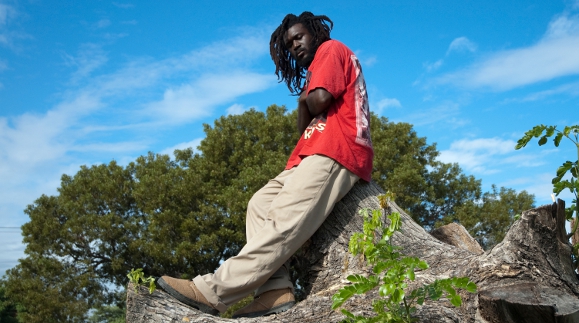
Read more about this topic
Read comments (3)
| Posted by Kenkoiso on 03.30.2010 | |
| Great interview!! My company will release Chezidek album I Grade in Japan on April 17. www.rhythmoflife-inc.com www.myspace.com/rolinc Bless Ken Koiso Rhythm Of Life Inc. |
|
| Posted by Bright Mhango on 04.16.2010 | |
| You do good music. I love LEAVE THE TREES simple but tough lyrics. Am from Malawi, Africa. Yeah you are that global. | |
| Posted by sensi ras on 08.23.2010 | |
| Chezidek is a true pure inspiration of goodness | |
Comments actually desactivated due to too much spams
Browse by categories
Recommended Articles
Latest articles
Recently addedView all
© 2007-2025 United Reggae. All Rights Reserved. Reproduction in whole or in part is prohibited. Read about copyright
Terms of use | About us | Contact us | Authors | Newsletter | A-Z














